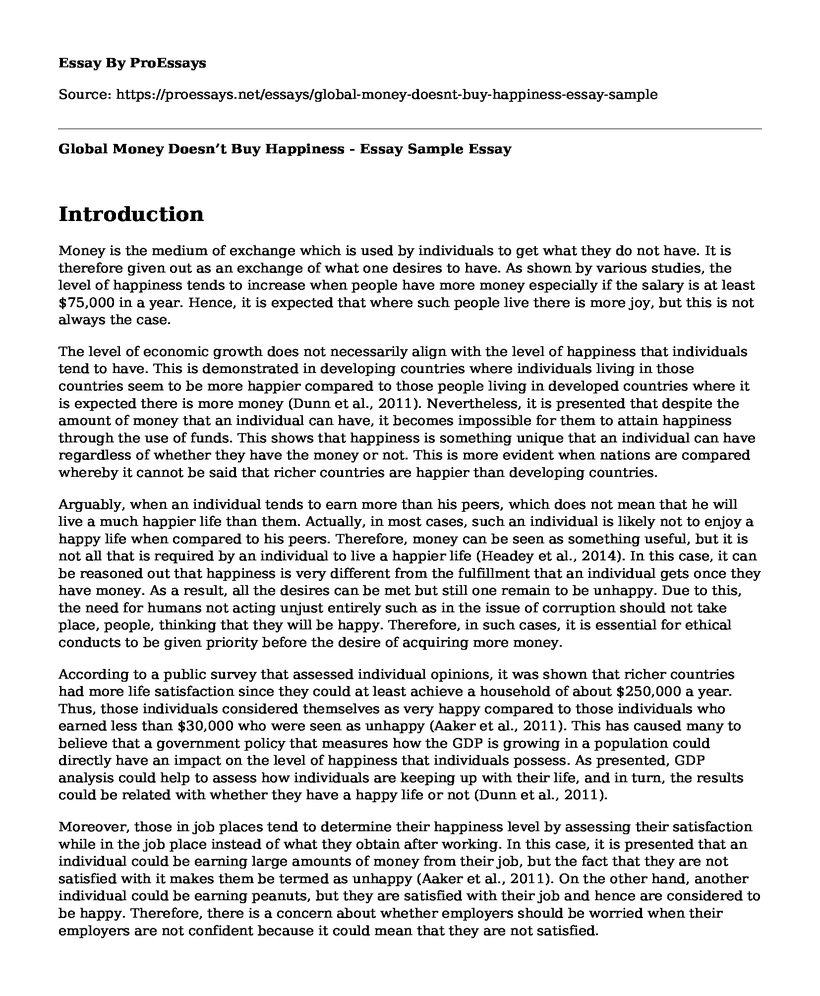Introduction
Money is the medium of exchange which is used by individuals to get what they do not have. It is therefore given out as an exchange of what one desires to have. As shown by various studies, the level of happiness tends to increase when people have more money especially if the salary is at least $75,000 in a year. Hence, it is expected that where such people live there is more joy, but this is not always the case.
The level of economic growth does not necessarily align with the level of happiness that individuals tend to have. This is demonstrated in developing countries where individuals living in those countries seem to be more happier compared to those people living in developed countries where it is expected there is more money (Dunn et al., 2011). Nevertheless, it is presented that despite the amount of money that an individual can have, it becomes impossible for them to attain happiness through the use of funds. This shows that happiness is something unique that an individual can have regardless of whether they have the money or not. This is more evident when nations are compared whereby it cannot be said that richer countries are happier than developing countries.
Arguably, when an individual tends to earn more than his peers, which does not mean that he will live a much happier life than them. Actually, in most cases, such an individual is likely not to enjoy a happy life when compared to his peers. Therefore, money can be seen as something useful, but it is not all that is required by an individual to live a happier life (Headey et al., 2014). In this case, it can be reasoned out that happiness is very different from the fulfillment that an individual gets once they have money. As a result, all the desires can be met but still one remain to be unhappy. Due to this, the need for humans not acting unjust entirely such as in the issue of corruption should not take place, people, thinking that they will be happy. Therefore, in such cases, it is essential for ethical conducts to be given priority before the desire of acquiring more money.
According to a public survey that assessed individual opinions, it was shown that richer countries had more life satisfaction since they could at least achieve a household of about $250,000 a year. Thus, those individuals considered themselves as very happy compared to those individuals who earned less than $30,000 who were seen as unhappy (Aaker et al., 2011). This has caused many to believe that a government policy that measures how the GDP is growing in a population could directly have an impact on the level of happiness that individuals possess. As presented, GDP analysis could help to assess how individuals are keeping up with their life, and in turn, the results could be related with whether they have a happy life or not (Dunn et al., 2011).
Moreover, those in job places tend to determine their happiness level by assessing their satisfaction while in the job place instead of what they obtain after working. In this case, it is presented that an individual could be earning large amounts of money from their job, but the fact that they are not satisfied with it makes them be termed as unhappy (Aaker et al., 2011). On the other hand, another individual could be earning peanuts, but they are satisfied with their job and hence are considered to be happy. Therefore, there is a concern about whether employers should be worried when their employers are not confident because it could mean that they are not satisfied.
Conclusion
In conclusion, the issue of whether happiness can be bought remains to be an essential discussion. Like how it is presented not having or having money does not mean that an individual will be happy. As revealed from various life issues happiness is not directly depended on money owned. The two aspects do not have a robust and durable relationship.
References
Aaker, J. L., Rudd, M., & Mogilner, C. (2011). If money does not make you happy, consider time. Journal of consumer psychology, 21(2), 126-130.
Dunn, E. W., Gilbert, D. T., & Wilson, T. D. (2011). If money doesn't make you happy, then you probably aren't spending it right. Journal of Consumer Psychology, 21(2), 115-125.
Headey, B., Muffels, R., & Wooden, M. (2004). Money doesn't buy happiness.... Or does it? A reconsideration based on the combined effects of wealth, income and consumption.
Cite this page
Global Money Doesn't Buy Happiness - Essay Sample. (2022, Nov 28). Retrieved from https://proessays.net/essays/global-money-doesnt-buy-happiness-essay-sample
If you are the original author of this essay and no longer wish to have it published on the ProEssays website, please click below to request its removal:
- Intercom Enterprise Auditing Paper Example
- Self-Administered Consequences Essay Example
- Essay Example on Young People: Easy Banking Through E-Commerce & Digital Marketing
- Essay Sample on Exploring Autism at a Preschool Setting
- Mutual & Hedge Funds: Investing in Profitability & Diversification - Essay Sample
- Essay Sample on Maximizing Well-Being: Understanding Mindfulness & Its Link to Positive Psychology
- Paper Sample on Highly Stressed: Psychological Stress in People Living with HIV/AIDS in the US South







